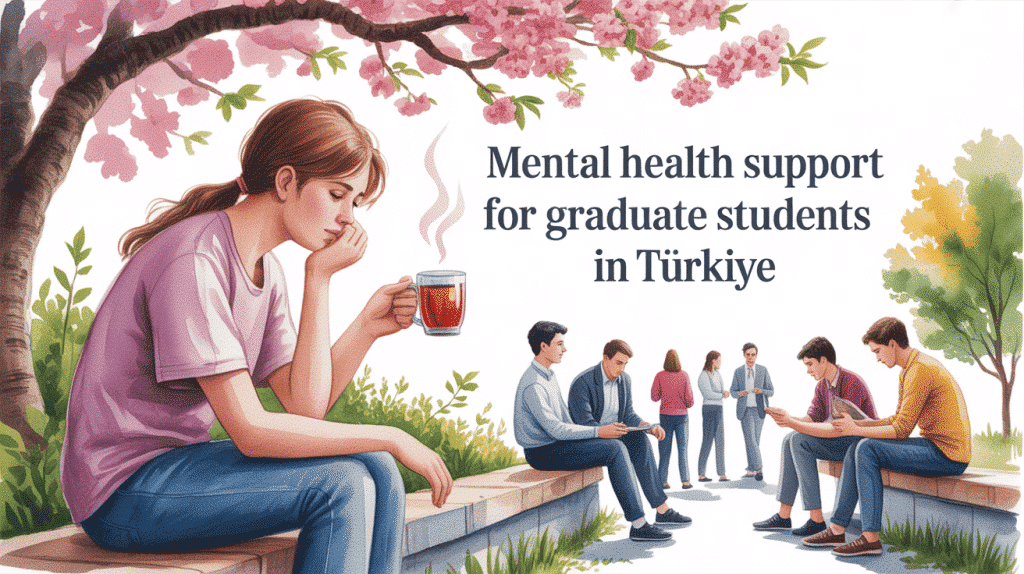Mental Health and Well-being Support for Graduate Students in Türkiye
Key Mental Health Challenges Faced by Graduate Students
Graduate students in Türkiye experience a variety of mental health concerns. The following are significant challenges identified through recent studies:
- Elevated Levels of Depression and Anxiety: The pressures of graduate studies can lead to heightened emotional distress. This includes symptoms of depression and anxiety, which can hinder academic performance and overall well-being.
- Academic Distress: Many graduate students experience significant levels of academic stress, often linked to intensive workloads, high performance expectations, and concerns about future career opportunities.
- Social and Economic Pressures: Financial difficulties, as well as the challenge of balancing personal and academic responsibilities, further complicate the mental health landscape for graduate students. These stressors can lead to feelings of isolation and overwhelm.
Studies have revealed that nearly 49% of those seeking psychological counseling at Turkish universities are graduate students, highlighting the importance of providing tailored mental health services to this demographic.
Factors Influencing Mental Health
Several factors can influence the mental health and well-being of graduate students in Türkiye:
- Gender and Age: Research suggests that the prevalence of mental health concerns may vary based on demographic factors such as gender and age.
- Place of Residence: Living arrangements can significantly impact mental health, influencing levels of support and accessibility to resources.
- Level of Education and Relationship Status: Graduate students’ educational status and personal relationships may also contribute to their mental well-being.
- Employment Status: Financial pressures stemming from part-time work or internships can exacerbate stress levels.
- Previous Psychological Help-Seeking: Those with a history of seeking psychological assistance may face different challenges, including stigmas or past traumas that affect their approach to mental health.
Understanding these factors elevates the ability of universities to design and provide services that meet the specific needs of their graduate student populations.
University Counseling and Psychological Support Services
To tackle these pressing mental health concerns, universities in Türkiye have established a range of psychological support services. These services are typically coordinated through dedicated counseling centers or psychological service units. The offerings may include:
- Confidential Counseling: Individual and group counseling sessions provide a safe space for students to discuss their issues and develop coping strategies.
- Peer Support Groups: These groups encourage a sense of community and shared experience among students, helping combat feelings of isolation.
- Workshops and Seminars: Institutions often conduct sessions focused on stress management, resilience, and self-care techniques.
- Crisis Intervention Services: Immediate support is available for students experiencing acute psychological distress, ensuring urgent situations are addressed promptly.
Accessibility and Inclusivity in Mental Health Services
Turkish universities strive to ensure that mental health services are accessible to all students, regardless of their backgrounds. Key elements include:
- Convenient Access: Mental health resources are offered at varied times and locations across campuses to accommodate diverse schedules.
- Awareness Campaigns: Consistent advertising of mental health services is crucial for encouraging students to seek help when needed.
By prioritizing accessibility and inclusivity, universities aim to break down barriers to mental health support.
Tailored Support for International Graduate Students
International graduate students often face unique stressors, such as cultural adjustment, language barriers, and feelings of isolation. Recognizing these needs, universities in Türkiye take intentional steps to provide tailored support, which may include:
- Needs Assessments: Conducting intake interviews helps counselors understand the specific challenges faced by international students.
- Culturally Sensitive Approaches: Services are designed collaboratively with an emphasis on respect for cultural differences, ensuring that all students feel understood and supported.
- Coordinated Care: By working in conjunction with academic staff and other student services, counseling centers can offer comprehensive support that addresses the full spectrum of student needs.
Coordination and Collaboration for Effective Mental Health Support
Effective mental health support requires collaboration across various university sectors. By ensuring regular communication between counseling centers, academic advisors, and other resource units, universities can deliver holistic and coordinated care. This approach fosters both academic success and personal well-being, allowing students to thrive in their graduate studies.
Conclusion
Graduate students in Türkiye encounter distinct mental health and well-being challenges, making it imperative for universities to develop robust counseling and psychological services. By focusing on accessibility, inclusivity, and culturally sensitive support—especially for international students—Turkish institutions are increasingly committed to nurturing the overall well-being of their graduate student communities.
For universities looking to optimize their mental health resources and support existing or potential international students, partnering with platforms like Study in Türkiye can provide valuable insights and solutions.
Take the Next Step with Study in Turkiye
Explore further to better understand mental health support and resources available to you as a graduate student in Türkiye.

